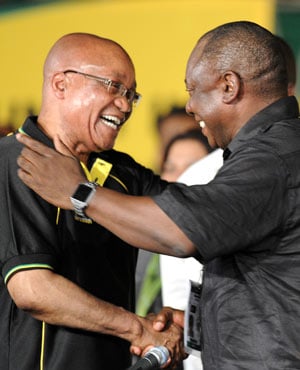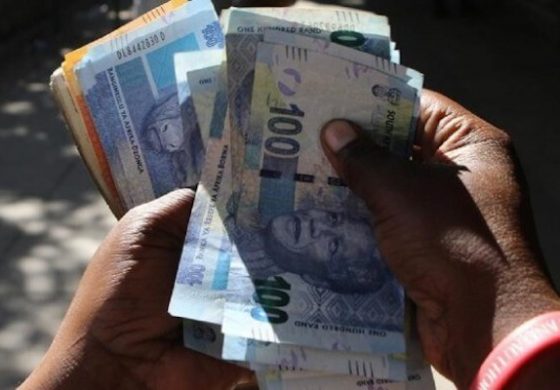2017-11-01 06:53

(Picture: AFP)

Despite the president’s denial, the rumour that Cyril Ramaphosa is about to be fired as deputy president persists.
Many senior ANC figures still privately express their belief that his dismissal is on the cards. The reason for the removal is apparently another intelligence report indicating that Ramaphosa is a spy for or collaborated with a foreign government to overthrow the current regime. (At this point I can’t decide whether to yawn with boredom or laugh with disbelief.)
As we should all know by now, we should never put anything beyond Jacob Zuma – no matter how ridiculous it may sound. I’m sure that the Zuma camp wants nothing more than to get rid of Ramaphosa, politically speaking.
Of course the old tried and tested sex scandal didn’t work. (Did anyone seriously think that with No 1’s history a few affairs were going to bother the nation or ANC branches?) But as stated before, that will not be the end of the story and a treason charge can seriously damage Ramaphosa’s campaign in the ANC.
The timing will however be crucial. To remove Ramaphosa (even if it is on the back of a treason charge) would be extremely risky for President Zuma. He would run the risk of a revolt in the ANC NEC and especially the ANC caucus in Parliament.
It is widely said that should he remove Ramaphosa, the ANC would encourage the opposition to bring another vote of no-confidence and that this time the motion would pass with the help of ANC MPs.
Zuma will also know that if he fires Ramaphosa it will free him from his deputy presidential duties to focus on his campaign. This is of course what Zuma did after Mbeki dismissed him. In addition it will presumably also give Ramaphosa enough time to counter the charges. So it might even backfire on the Zuma camp.
However, I believe the Zuma camp will keep a close eye on the outcome of the ANC branch nomination process. If it becomes clear in a few weeks from now that Ramaphosa poses a real threat to their candidate’s chance of success the Zuma-lead camp would make a move.
I have always maintained that Zuma will have a final trump card in his back pocket. Whether it is a treason charge or something else, he would most likely only play that card after parliament has gone into recess at the end of November. This would leave him with two weeks before the conference – enough time to cause havoc, yet there would not be enough time to call back parliament or for Ramaphosa to fight back.
Interestingly it seems Ramaphosa is not the only one in the firing line. The whispers that Finance Minister Malusi Gigaba might also be facing the axe, increased dramatically after his delivery of the MTBS last week.
According to rumours there was great unhappiness in Cabinet about the “over honest” MTBPS and it was said that the president instructed Gigaba to limit his engagements with the media about it.
But it seems it is not only the MTBPS that caused a problem. It is again that old prickly pear of a nuclear deal that is causing a break down in relations.
Although Gigaba’s speech repeated the Pravin Gordhan line which diplomatically states: “that the programme will be implemented at a pace and scale that the country can afford”, Gigaba told both journalists and the business community in no uncertain terms that the country cannot afford nuclear, nor is there a demand for additional electricity at this stage.
In contrast David Mahlobo, Zuma’s great ally now in charge of our atomic future, did not agree. “We will continue,” he said immediately after the MTBPS. When challenged by a journalist with Gigaba’s position of unaffordability he responded: “Never speculate. With that data, what is the source? We will continue with the programme and nuclear is part of that programme.”
So there you have it. Gigaba says no, Mahlobo says yes. One thing we know is that you don’t last long in your Cabinet position if you don’t abide by No 1’s instructions, especially when it comes to nuclear it seems.
Naturally timing is again crucial if Zuma wants to fire his finance minister. It would make sense to do it after the next announcement by the rating agencies. All economists and analysts seem to agree that, following the MTBPS, we will see another downgrade at the end of November.
Inevitably that would have a negative effect on the markets, which could give Zuma the gap to get rid of Gigaba for not doing his job effectively. But it could also give him the opportunity to get rid of Ramaphosa.
President Zuma will know that to fire Ramaphosa will cause very negative market reactions both domestically and internationally. This could result in an ANC revolt similar to the one post-Nene, except this time it could be much bigger.
However, if he fires Ramaphosa when the markets are already reacting to another downgrade, it will partially “hide” the impact of a Ramaphosa removal, thus making internal revolts more difficult.
Since the downgrade is likely to happen just as Parliament is going into recess at the end of November (as well as no further Cabinet or NEC meetings until the end of the year) and it will be at a time when the Zuma camp will have a much clearer idea of their chances of a victory at the conference, the first two weeks in December will be the most likely time for all these moves.
If I was working in the financial markets, I would not make holiday plans for early December. It will most likely be the rockiest and most dangerous two weeks that this country has faced since democracy.
– Melanie Verwoerd is a former ANC MP and South African Ambassador to Ireland.
Disclaimer: News24 encourages freedom of speech and the expression of diverse views. The views of columnists published on News24 are therefore their own and do not necessarily represent the views of News24.
http://www.news24.com/Columnists/MelanieVerwoerd/two-weeks-in-december-the-most-critical-time-for-sa-since-94-20171101

